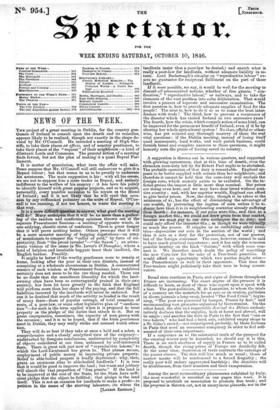NEWS OF THE WEEK.
Tax project of a great meeting in Dublin, for the country gen- tlemen of Ireland to consult upon the dearth and its remedies, appears likely to be realized, though not exactly in the shape de- vised by Mr. O'Connell. He intended a meeting of High She- riffs, to take their places etc qfficio, and of country gentlemen, to take their places at the "request" of their neighbours—a kind of dilettanti Lords and Commons. The general notion of a meeting finds favour, but not the plan of making it a quasi Repeal Par- Bement.
It is matter of speculation, what turn the affair will take. Some suppose that Mr. O'Connell will still endeavour to give it a Repeal colour ; but that seems to us to be greatly to underrate his astuteness. The main suggestion is his : with all his errors, we are not to suppose him a mere trader in Repeal, and entirely indifferent to the welfare of his country : it has been his policy to identify himself with great popular projects, and so to acquire, personally, every possible accession to his repute as the friend of Ireland; and it is not likely that he will spoil this occa- sion by any stiffnecked pedantry on the score of Repeal. O'Con- nell is too cunning, if not too honest, to waste the meeting in that way.
It is a more difficult question to answer, what good the meeting Will do? Many anticipate that it will be no more than a gather- ing of the random and conflicting opinions thrown out at the separate Presentment Sessions—a meeting of opposite winds, in one eddying, chaotic storm of confusion. There is great danger that it will prove nothing better. Others presume that it will be a mere monster meeting of begging deputations—an army of mendicants to cpnquer the "collar of gold," by, force of im- portunity, from "the proud invader "—" the Saxon ; an aristo- cratic version of the scene in Mr. Lever's O'Donoghue, where a herd of helpless and insatiable beggars beset their landlord, the English banker. Possibly. It might be better if the worthy gentlemen were to remain at borne, looking after the poor in their own districts, instead of conspiring at a wholesale absenteeism in Dublin. A concentrated essence of such wisdom as Presentment Sessions have exhibited certainly does not seem to be the one thing needed. There can be no doubt that the munificent liberality for which the land- owning class have been so extravagantly praised in their own country, has been let loose greatly in 'the faith that England will perform more than her share of the paying, and that the full liabilities incurred by the landlords will never beenforced. Nor can it be doubted that much of the activity so lauded is the result of many fears—fears of popular outrage, of total cessation of rents, of a poor-law, or some other legislative plan of " confisca- tion "—for such is the term applied when it is proposed to treat property as the pledge of the duties that attach to it. But on great emergencies, sometimes, the capacity of men grows with the occasion ; and it is to be hoped, that if the Irish gentlemen meet in Dublin, they may really strike out counsel worth atten- tion.
They will do so best if they take at once a bold and a sober, a comprehensive and a closely analytical view of the exigency— undisturbed by foregone conclusions, undistracted by complexity Of objects considered at one time, unbiassed by self-interested fears. There is great talk just now of " reproductive labour," to which the Lord-Lieutenant has given in. That phrase means, employment of public money. in improving private property. Relief to able-bodied paupers is loudly deprecated : why, then, grant an enormous alms to able-bodied landlords ? It is true that it would be good to improve the land ; but waste and jobbery will absorb the vast proportion of "free grants." If the land is to be improved at the cost of the State, let the State have suffi- cient •pledge that the object be fulfilled: that pledge is the land itself. This is not an occasion for landlords to make a profit—to petition in the name of the starving labourers, (to whom the
landlords insist that a poor-law be denied,) and snatch what is really a poor-law for landlords, without adequate liability in re- turn. Lord Besborough's circular on "reproductive labour" ex- acts no guarantee for reciprocal fulfilment on the part of those landlords.
If it were possible, we say, it would be well for the meeting to discard all preconceived notions, whether of free grants, " con- fiscation," " reproductive labour," or railways, and to take the elements of the vast problem into calm deliberation. That would involve a process of separate and successive examination. The first question is, bow to provide adequate supplies of food for the people? The next is, how to do it so as to cause the least inter- ference with trade ? The third, how to prevent a recurrence of the disaster which has visited Ireland in two successive years ? The fourth, how the crisis, which compels action of some kind, can be improved for the permanent benefit of Ireland, even if it be by altering her whole agricultural system ? No class, official or other- wise, has yet evinced any thorough mastery of these the real vital questions : if the Dublin meeting, instead of losing itself amid assessments, local works, and such pariah business, could furnish broad and complete answers to those questions, it might honestly earn the praise of having saved its country.


























